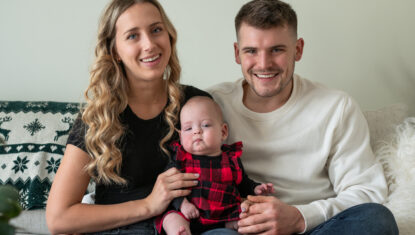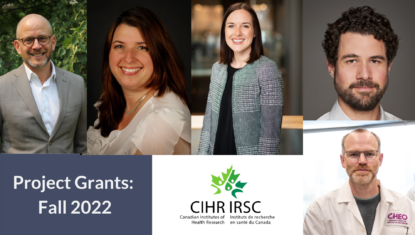The Neonatal Intensive Care Unit (NICU) research group is a multi-disciplinary group that participates in many types of research that affect the care of newborn infants, from the extremely preterm to the critically ill term infant. The group consists of neonatologists, NICU fellows, nursing researchers, research collaborators from other departments at CHEO and a dedicated NICU research coordinator. The research done by our group includes database research, randomized controlled trials, laboratory (pre-clinical) research, quality-improvement and neonatal follow-up research. The overall aim of our research group is to improve the care provided to preterm and critically ill newborn infants.
Significant areas of research include:
- leading edge treatments for chronic lung disease of prematurity
- neonatal pain management
- detection and treatment of severe intestinal disease in premature infants
- shared decision making at the limit of viability
- mock codes teaching to trainees
- methods for teaching trainees the ethics of working with this vulnerable population
- detection of seizure activity in sick neonates
- methods to improve team communication during medical emergency care
- improvements in newborn screening for treatable disorders
- outcome predictions for sick patients in the NICU
- treatment of respiratory distress in preterm infants
- improvement of infant survival in developing countries
- Point of care ultrasound use in the NICU
- Management of patent ductus arteriosus and use of Targeted Neonatal Echo in the NICU
Related News
Research Projects
-
Sound Level Within Transport Incubator During Use of Ambulance Siren
26/04/2024
-
Lipocalin-2 and calprotectin as stool biomarkers for predicting necrotizing enterocolitis in premature neonates
31/08/2021
Although not yet fulfilling the “perfect biomarker” criteria, it represents a first step toward it.
-
Nonauscultatory clinical criteria are sensitive for cardiac pathology in low-risk paediatric heart murmurs.
25/08/2021
Basic clinical criteria that do not require auscultation are highly sensitive for ruling out significant cardiac pathology in children over 12 months of age.
-
Medications to manage infant pain, distress and end-of-life symptoms in the immediate postpartum period
18/08/2021
-
Medications to manage end-of-life symptoms in the immediate postpartum period
18/08/2021
There is a need for standardization of the medical management of infants born with life-limiting conditions whose parents choose to pursue palliative care.
-
Impact of a web-based module on trainees’ ability to interpret neonatal cranial ultrasound
29/11/2020
A WBL module for teaching neonatal CUS interpretation considerably improved trainees’ knowledge and enhanced their skills in interpreting neonatal CUS.
-
Abnormal placental pathological findings and adverse clinical outcomes of oocyte donation
02/11/2020
Placental pathology reflecting dysregulated immune processes and vasculopathy is associated with oocyte donation.
-
A lung tropic AAV vector improves survival in a mouse model of surfactant B deficiency
06/08/2020
This vector also transduces human lung tissue, demonstrating its potential for clinical translation against this lethal disease.
-
Evaluating parental perceptions of written handbooks provided during shared decision making with parents anticipating extremely preterm birth
27/07/2020
Overall, parents positively evaluated the handbooks, supporting their utility for parents anticipating extremely preterm birth. Concrete suggestions for improvement were made; the handbooks will be modified accordingly. Parents at other perinatal centers may benefit from receiving such handbooks.
-
Risk of Lower Birth Weight and Shorter Gestation in Oocyte Donation Pregnancies Compared With Other Assisted Reproductive Technology Methods: Systematic Review
04/07/2020
A high degree of interstudy heterogeneity exists, and the association between OD and infant outcomes remains unclear.
-
Whole-body vibration in neonatal transport: a review of current knowledge and future research challenges
01/07/2020
This review intends to highlight what is known about vibration as a physical stressor in neonates and areas for further research; with the goal to making recommendations for minimizing these stressors during transport.
-
Characterization of the innate immune response in a novel murine model mimicking bronchopulmonary dysplasia
01/05/2020
This is the first report of in-depth characterization of the lung injury and recovery describing the evolution of the innate immune response in a standardized mouse model for experimental BPD with postnatal LPS and hyperoxia exposure.
-
Paediatric ethical issues during the COVID‐19 pandemic are not just about ventilator triage
01/05/2020
the COVID‐19 pandemic is creating many ethical challenges. One of the most difficult is for ethicists to focus on the issues that are likely to have the greatest impact. Ventilator allocation in a crisis situation is a deeply tragic choice that requires careful balancing of a number of values
-
A novel method for quantitation of acylglycines in human dried blood spots by UPLC-tandem mass spectrometry
01/04/2020
This method shows potential application as a second tier screen in order to reduce the false positive rate for a number of IEM targeted by newborn screening.
-
Exploring Acceptance and Commitment Therapy for parents of preterm infants
01/02/2020
One promising intervention that has not been explored in the NICU is Acceptance and Commitment Therapy (ACT), a behavioural therapy that has had positive mental health-related outcomes in similar parental populations.
-
Racial differences in contribution of prepregnancy obesity and excessive gestational weight gain to large-for-gestational-age neonates
01/02/2020
Excessive gestational weight gain contributed more to LGA neonates than prepregnancy obesity in Whites and Asians, while there was no difference between excessive gestational weight gain and prepregnancy obesity in their contributions to the LGA neonates in Blacks. The differences are mostly driven by the differential prevalence of the two risk factors across racial groups.
-
Racial/ethnic variations in gestational weight gain: a population-based study in Ontario
09/08/2019
Inadequate and excessive gestational weight gain (GWG) have both been linked with a number of adverse maternal and neonatal outcomes, which in turn also vary by race/ethnicity (Headen et al. 2012).
-
The transplacental passage of commonly used intrapartum antibiotics and its impact on the newborn management: A narrative review
09/08/2019
Maternally-administered ampicillin, penicillin, and cefazolin rapidly achieve therapeutic levels in the fetal circulation.
-
Do transport factors increase the risk of severe brain injury in outborn infants less than 33 weeks gestational age?
01/08/2019
Risk factors for SBI were related to the condition at birth and immediate postnatal management and not related to transport factors. These results highlight the importance of maternal transfer to perinatal centers to allow optimization of perinatal management.
-
Association Between Self-reported Prenatal Cannabis Use and Maternal, Perinatal, and Neonatal Outcomes
18/06/2019
Among pregnant women in Ontario, Canada, reported cannabis use was significantly associated with an increased risk of preterm birth.
-
Infrared Imaging Tools for Necrotizing Enterocolitis (NEC) Diagnosis Guided by RGB-D Sensing
01/05/2019
In this paper, we present a novel automated image acquisition and processing system that integrates infrared and RGB-D sensors for NEC detection.
-
Target oxygen saturation and development of pulmonary hypertension and increased pulmonary vascular resistance in preterm infants
01/01/2019
Higher targeted oxygen saturation was associated with reduced risk of PH or elevated PVR in extremely preterm infants compared to lower oxygen saturation target.
-
Hypothermia for Newborns With Hypoxic-Ischemic Encephalopathy
12/06/2018
Because some studies included infants born at 35 weeks GA, hypothermia should be considered if they meet other criteria.
-
Developing an Automated Clinical Trending Tool for the Neonatal Intensive Care Unit (NICU)
30/05/2018
-
Counselling and Management for Anticipated Extremely Preterm Birth
01/09/2017
Counselling couples facing the birth of an extremely preterm infant is a complex and delicate task, entailing both challenges and opportunities.
-
Neonatal ethics teaching program-scenario-oriented learning in ethics: announcing the diagnosis of trisomy 21
05/05/2017
The pilot workshop was completed by 21 postgraduate trainees from the University of Ottawa. Qualitative evaluations were overwhelmingly positive, with feedback indicating high levels of perceived usefulness for the workshop.
-
Resolution of refractory hypotension and anuria in a premature newborn with loss-of-function of ACE
01/07/2015
Vasopressin was used to successfully treat refractory hypotension and anuria in the neonate born at 27 weeks of gestation.
-
Occult Tethered Cord Syndrome: A Review
03/09/2013
As occult tethered cord syndrome becomes increasingly recognized, it is important to be aware of the potential benefits of operative intervention for appropriately selected patients.
Researchers
-
Erika Bariciak
Investigator, CHEO Research Institute
-
Nadya Ben Fadel
Investigator, CHEO Research Institute
-
Private: Samantha Boggs
Investigator, CHEO Research Institute
-
Kym M Boycott
Senior Scientist, CHEO Research Institute
-
Daniel Corsi
Scientist, CHEO Research Institute
-
David A. Dyment
Scientist, CHEO Research Institute
-
Dina El Demellawy
Investigator, CHEO Research Institute
-
Deshayne Fell
Affiliate Investigator, CHEO Research Institute
-
Emanuela Ferretti
Investigator, CHEO Research Institute
-
Jeff Gilchrist
Associate Scientist, CHEO Research Institute
-
Radha Jetty
Investigator, CHEO Research Institute
-
Sherri Katz
Senior Scientist, CHEO Research Institute
-
Brigitte Lemyre
Investigator, CHEO Research Institute
-
Nathalie Lepage
Investigator, CHEO Research Institute
-
Nathalie Major
Investigator, CHEO Research Institute
-
Kusum Menon
Senior Scientist, CHEO Research Institute
-
Gregory Moore
Investigator, CHEO Research Institute
-
Jean Ngoie
Investigator, CHEO Research Institute
-
Stephanie Redpath
Investigator, CHEO Research Institute
-
Bernard Thébaud
Senior Scientist, CHEO Research Institute
-
Albert Tu
Investigator, CHEO Research Institute
-
Christina Vadeboncoeur
Investigator, CHEO Research Institute
-
Stephanie Veldhuijzen van Zanten
Investigator, CHEO Research Institute
-
Richard Webster
Investigator, CHEO Research Institute



























